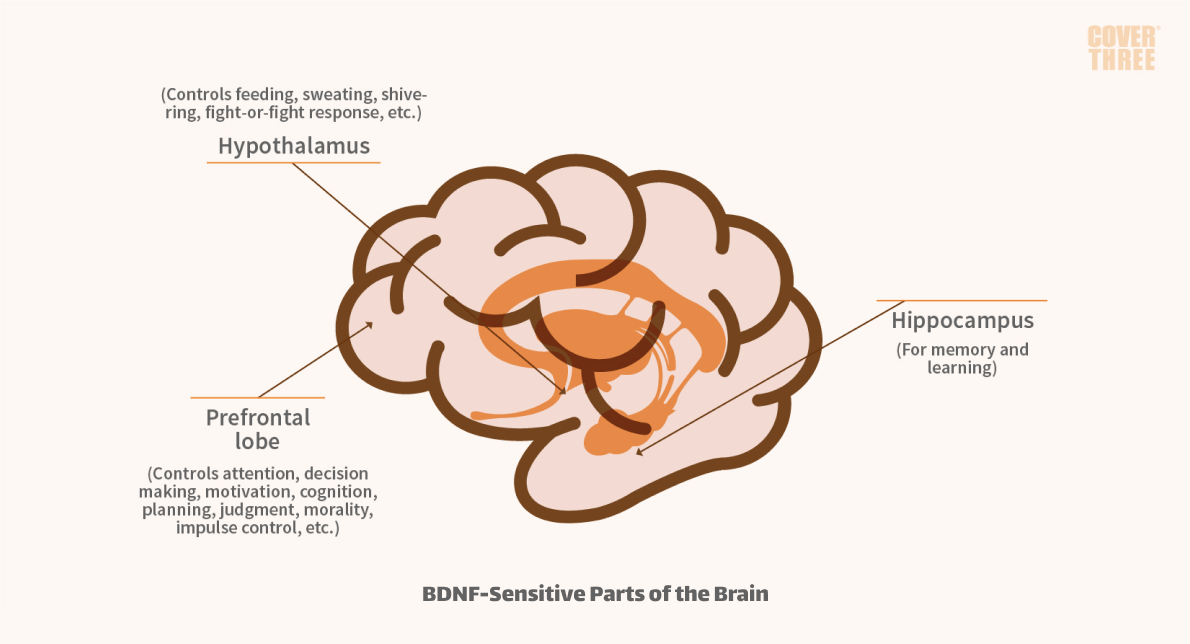BDNF Supplements
Looking for the best brain supplements for memory and focus? BDNF supplements are natural cognitive enhancers that support clear thinking, sharp memory, and long-term brain health. BDNF (Brain-Derived Neurotrophic Factor) is like a growth booster for your brain, helping with memory, learning, and overall mental sharpness.
Whether you're chasing big goals or just want to stay sharp in your daily life, keeping your brain healthy is key. The right brain supplements can help support your BDNF levels, making it easier to stay focused, think clearly, and keep your mind strong for the long run.
Think of it as giving your brain the fuel it needs to help you live life to the fullest.
What is BDNF?
BDNF is a special protein that helps keep your brain healthy and strong. Think of it as a growth booster for brain cells—helping them grow, connect, and function better.
Scientists have found that BDNF plays a huge role in memory, learning, and mental sharpness.
Here’s how it works:
- Neurogenesis—the growth of new brain cells. In young children, it occurs spontaneously as part of growth. In adults, it occurs in response to different stimuli.
- Synaptogenesis—the building of new neuronal junctions called "synapses." Synapses are necessary for brain cell communication and the performance of mental tasks.
- Pruning—the dissolution of neural connections that are no longer useful.
- Long-term potentiation (LTP)—the strengthening of synapses that are more often used, making them more efficient at signaling and processing.
Healthy BDNF levels are linked to better focus, cognitive function, and emotional balance—all essential for long-term mental performance. On the other hand, low BDNF levels have been associated with certain neurological and mental health conditions.
Keeping your brain strong starts with supporting BDNF production—and the right brain supplements can help.

How can you increase your BDNF levels?
Want to keep your brain sharp and healthy? There are many ways to increase BDNF levels in the brain, but they generally do so by at least one of the following:
- Brain stimulation - BDNF elevation follows activities that stimulate the brain and lead to LTP. Examples are brain exercises, physical training, social interaction, sunlight exposure and heat stress.
- Glucose depletion - Starvation leads to glucose depletion and ketosis, raising BDNF in critical brain regions. Sleep, exercise, intermittent fasting and the ketogenic diet all induce BDNF production by simulating the peak ketotic state.
- Stress reduction - Stress hormones build up due to chronic stress, and they reduce BDNF significantly. Stress management, i. e. by meditation, sleeping, etc., increases brain BDNF levels.
- Nourishment - Brain-healthy foods serve as the neurons' clean fuel, building blocks, toxin shields and promoters of healthy function. The best part of all: they stimulate brain BDNF secretion.
All of these approaches are effective in increasing BDNF levels in the brain.
However, active, success-driven individuals may not be able to do all of them. People who create and do not wait for opportunities will find that modern science has discovered efficient yet natural ways to boost their BDNF.
What are the best brain nutrients for increasing BDNF?

Heart-healthy diets include a good mix of vegetables, fruits, grains, low-fat dairy, proteins and oils. However, the best ones for the brain have high amounts of BDNF-boosting nutrients and use other mechanisms as well to enhance brain performance.
Those nutrients are:
- Alpha-glycerophosphocholine (alpha-GPC), which is needed for the production of the memory neurotransmitter acetylcholine and myelination of brain cells.
- Curcumin, which has antioxidant, anti-inflammatory and immune-boosting properties. It also increases the mental focus of neurotransmitters dopamine and norepinephrine.
- Omega-3 fatty acids make up the neurons' fatty membranes, which speed up signaling. They also absorb toxic oxidative free radicals and prevent chronic inflammation.
- Trans-resveratrol is an antioxidant found abundantly in grapes and berries. It induces BDNF production in the hippocampus and prefrontal lobe, enhancing learning and mood.
- Uridine is found in high levels in dark green vegetables. It is critical to neuronal multiplication, neurotransmitter production, energy generation and brain immunity.
- Vitamin C has similar actions in the central nervous system as curcumin. Rich sources include berries and citrus fruits. It also helps regulate nerve carbohydrate metabolism.
Only a well-balanced diet can help ensure that one is getting optimum amounts of these nutrients. However, the modern world demands much from the born achievers, making it difficult for them to get complete meals all the time.
What are the benefits of having healthy BDNF levels?
Individuals with higher BDNF levels showthe following signs of enhanced mental performance:
- Excellent memory and problem-solving skills
- Sharp mental focus
- Emotional resilience
- Delayed brain aging
Similarly, BDNF-enhancing activities have been shown to improve symptoms of nerve oxidative stress.
For instance, intermittent fasting has been proven to reduce pain associated with chronic inflammation. Likewise, aerobic exercise can stave off cognitive impairment and depressive symptoms in people with age-related illnesses.
Meanwhile, many people who have tried Cover Three Brain Assist attest to its beneficial effects, especially after experiencing a significant mental performance boost with regular intake.
How does BDNF connect fasting with brain health?
Intermittent fasting is known to be an effective strategy for enhancing body and brain health. People with neurologic conditions have likewise displayed significant improvement when put on calorie-restricted diets.
Studies show that BDNF is the key molecule that mediates the beneficial effects of fasting on the brain. However, timing is crucial and only after reaching the peak ketotic state will BDNF production be induced.
For more information about the link between fasting and brain health, you may read the article "How to Ramp Up Your BDNF and Mental Focus by Fasting."
What can cause BDNF deficiency, and why is that condition bad for you?
Everyone wants to have a laser-sharp focus to achieve their biggest goals, and you can have it by maintaining higher BDNF levels. However, various factors can keep you from reaching optimum concentrations of this neurotrophic factor.
They include the following:
- Lack of brain stimulation
- Sugary diets
- Chronic stress
- Wrong food choices
- Brain impact
Additionally, low BDNF levels trigger the onset of various mental health problems among highly functional individuals, such as:
- Loss of concentration or attention
- Memory deficits
- Early brain aging
- Depressed mood
Some neuropsychiatric illnesses are also strongly associated with low BDNF levels in the brain. They include:
- Age related cognitive issues
- Mood disorders
- Motor control disorders
These findings only prove that BDNF is essential to brain health. So if you think you may be at risk for developing BDNF deficiency, just remember to take your Cover Three Brain Assist. It contains the best brain nutrients for boosting your BDNF quickly and naturally.
Unlock your full potential with the best BDNF stimulating nutrients
To live a full life is to be free to pursue one's passions and do so successfully. Ancient philosophers believed that mental power was crucial to mastering one's destiny. Now, modern science proves that BDNF is the key to unlocking the brain's maximum potential.
BDNF is a growth factor that promotes brain health. Individuals with optimum BDNF levels have superb cognitive function and emotional resilience. Meanwhile, insufficient levels of this growth factor are strongly associated with disabling neuropsychiatric conditions.
BDNF secretion can be induced by brain cell stimulation, glucose deprivation, stress reduction, proper nutrition or a combination of these mechanisms.
Finally, the best BDNF-boosting nutrients are found in brain-healthy foods. They are alpha-GPC, curcumin, omega-3 fatty acids, trans-resveratrol, uridine and vitamin C. Active individuals may get all these important neuroprotective vitamins from a well-balanced diet.
Want an easy way to support your brain health? Cover Three Brain Assist provides essential nutrients to naturally boost BDNF, enhance focus, and improve memory—backed by science.

